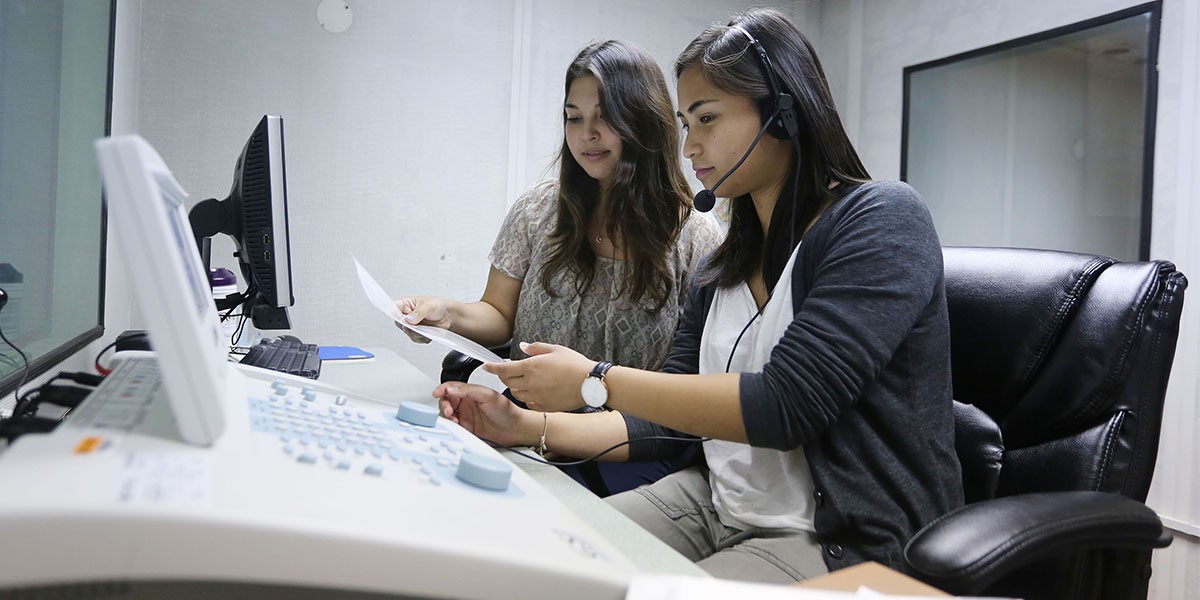Information on this page is for general guidance only. Admission and licensure requirements vary and may change; students must verify details with relevant schools or licensing bodies. Strong performance in related coursework and extracurricular experiences will help strengthen your preparation.

“Audiologists are the primary health-care professionals who evaluate, diagnose, treat, and manage hearing loss and balance disorders in individuals of all ages from infants and teens to adults and the elderly.” – American Academy of Audiology
Audiologists work in many types of settings, including:
- Hospitals
- Clinics
- Private practices
- ENT offices
- Universities
- K-12 schools
- Government
- Military Veterans’ Administration (VA) hospitals
Audiologists are educated and trained to evaluate, diagnose, treat, prevent, and manage hearing loss and balance disorders, as well as program hearing aids, cochlear implants, assistive listening devices, bone-anchored hearing aids, and more.
According to the Bureau of Labor Statistics of the U.S. Department of Labor, "Employment of audiologists is projected to grow 13 percent from 2019 to 2029, much faster than the average for all occupations. Hearing loss increases as people age, so an aging population is likely to increase demand for audiologists." The early identification and diagnosis of hearing disorders in infants also will impact employment growth.
To become an audiologist, a student must earn a bachelor's degree first before pursuing an AuD, PhD, or combination AuD/PhD degree. While there is no specific bachelor’s degree a student must receive, many times students choose undergraduate majors such as communication disorders, or other related area, to prepare them for a required three- or four-year audiology program.
Students may choose to pursue an AuD program, PhD program, or a combination AuD/PhD program. The AuD is an entry-level degree needed for the clinical practice of audiology. Students who choose to pursue an AuD degree will be prepared for independent clinical practice areas of auditory and vestibular assessment and treatment and reimbursement from third-party payers. Completion of the degree typically requires four years of full-time study. Students who want to pursue this degree should check in with the AuD program of their choice to learn more about any specific prerequisite coursework that needs to be completed during their bachelor’s degree. Additionally, once the AuD program is completed, students will be required to hold a license in the state they wish to practice in.
If you are looking to pursue one of these doctoral program types, take a look at the Doctoral Programs in Audiology List; you may also view the Audiology Doctoral Programs List by State,
Audiologists typically do the following:
- Examine patients who have conditions related to the outer, middle, or inner ear
- Assess the results of the examination and diagnose problems
- Create treatment plans to meet patients’ goals
- Provide care for routine procedures, such as testing
- Fit and dispense hearing aids and other assistive listening devices
- Counsel patients and their families on ways to listen and communicate, such as by lip reading or through technology
- Evaluate patients regularly to monitor their condition and modify treatment plans, as needed
- Record patient progress
- Research the causes and treatment of hearing and balance disorders
- Educate patients on ways to prevent hearing loss
Taking the Next Step
Application Process and Academic Requirements
Doctor of Audiology programs require completion of an undergraduate degree. Additional requirements will vary depending on the program. Many programs require an application using CSDCAS (Communication Sciences and Disorders Centralized Application Service). CSDCAS is administered by an independent third-party provider and is not associated with any specific program. Some programs require a CSDCAS application along with an additional university application (check each program’s requirements).
Below is an example of Cal State LA admission requirements. Requirements for admission to the Audiology Doctoral program include the following:
Completion of a baccalaureate degree in audiology or communication sciences and disorders. If the baccalaureate degree is not in the area of audiology or communication sciences and disorders, applicants should have completed six courses in the following content areas prior to the first semester of the program (or their equivalents, as determined by the AuD Program Director).
This is not a comprehensive list; please refer to your preferred program's website.
- COMD 4000 (Hearing Science)
- COMD 4020 (Audiology and Audiometry)
- COMD 4200 (Rehabilitative Audiology)
- COMD 4630 (Neuroscience of Communication)
- a course in Statistics
and at least one course from among the following:
- COMD 4220 (Advanced Audiology)
- COMD 4560 (Language Development)
- COMD 4610 (Descriptive Phonetics)
- COMD 4620 (Anatomy and Physiology of the Speech Mechanism)
- A minimum 3.0 grade point average (GPA) in undergraduate coursework
- A minimum 3.0 GPA in undergraduate or prerequisite audiology and communication sciences coursework
- Completion of an on-campus interview, if selected for an interview
Achievement of minimum criteria does not guarantee admission to the AuD program. Admission to the program is a competitive process whereby a committee composed of faculty evaluates the credentials of all applicants.